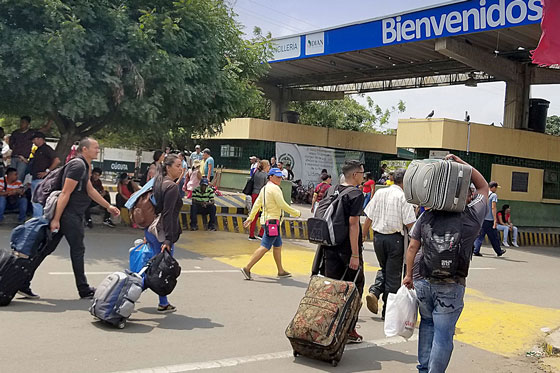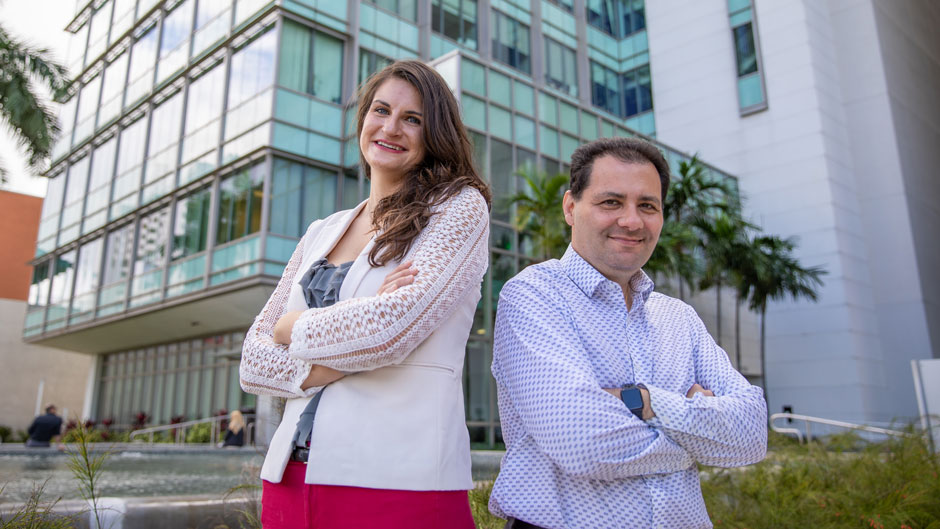In the late 1990s, people started trickling out of Venezuela when dictator Hugo Chávez began transforming the country into a socialist nation.
But more recently, as the once prosperous democracy has devolved into poverty and political unrest under President Nicolás Maduro, the outward stream of Venezuelans has turned into a flood.
More than 4 million people have left the country since 2000 alone, reports from the United Nations indicate. And last week, Maduro was indicted by the U.S. Attorney General for taking part in a global cocaine trafficking ring, a move that many see as the Trump administration’s attempt to push Maduro out of office.
Meanwhile, people continue to leave Venezuela, desperate for a better life elsewhere.
But how is this massive life change affecting the Venezuelan immigrants?
This question is the basis of the research being conducted by Seth Schwartz, a public health sciences professor in the University of Miami Miller School of Medicine, and graduate student Saskia Vos. The two are analyzing the mental health impacts on nearly 650 Venezuelan parents who have moved to Miami or Colombia during the past three years. They have learned that the process of leaving their home is taking a major toll.
“We have found incredibly high rates of post-traumatic stress disorder (PTSD) in Venezuelans who are living in Miami and in Colombia,” Vos said.

For the study, Schwartz surveyed close to 300 Venezuelans living in Bogotá, Colombia, and 339 who live in South Florida about their reasons for leaving, as well as their feelings about their new home countries. The top reasons among all for abandoning their homes in Venezuela were the nation’s mass shortages in food, water, medicine, and other necessities. In addition, many stated that there were hardly any jobs in Venezuela, and those that existed did not pay enough for everyday survival.
Yet the researchers found major differences between Venezuelans living in Miami today and those who moved to Colombia. For example, those who immigrated to Miami often come as entire family units and typically the parents are college-educated, some with even advanced degrees. Venezuelans living in South Florida also said they left because they worried about the government targeting them, and some were afraid for their lives, Vos added.
“Political persecution was another reason for them leaving,” Vos added. “People said either they or family members were being hunted by the government, because they said something wrong.”
Perhaps as a result of that pressure, South Florida Venezuelans also exhibited more symptoms of PTSD than those living in Colombia, Schwartz and Vos said.
“What we are finding is that this is a population that is experiencing a lot of stress, and some post-traumatic stress disorder,” said Schwartz, citing that 31 percent of participants now living in the U.S. showed signs of PTSD, while 21 percent of those living in Colombia had those indications.
Meanwhile, Venezuelans now living in Colombia said they left the country for economic reasons, and data indicate they often moved without their children. This population was also much more likely to have high school as their highest level of education.
“The people who went to Colombia are not the same kind of people who moved to the United States,” said Schwartz, who focuses his research on crisis migration. “They are not the same socioeconomic status and have somewhat different reasons for leaving.”
In addition, while Schwartz and Vos expected that Venezuelans would feel more comfortable in Colombia—without the language or cultural barriers that might be a hurdle in the United States—they found the opposite, Vos said. These people still had high levels of anxiety and did not feel welcome in Colombia. For example, one woman even wrote that Colombian children would not play with her son because he was Venezuelan.
“Venezuelans in Colombia were having a harder time and facing more discrimination. People really didn’t want them there,” Vos said. “Families that came to South Florida, even with a struggle, were more optimistic and hopeful that they could make a life here. But families in Colombia are still in survival mode.”
And most of the time these immigrants are unable to get treatment. While Venezuelans in the United States are sometimes waiting six years for asylum, Schwartz said they are focused on basic needs in a new country—such as getting a job, feeding the family, and providing a stable home. So, a mental health appointment is seen as a luxury.
“Because a lot of these immigrants are undocumented, they are afraid to get services because they are worried about Immigration and Customs Enforcement showing up,” Vos added. “It’s a very difficult situation, where they are scared or can’t afford it.”
Schwartz has also collaborated with Christopher P. Salas-Wright, associate professor with Boston University, to examine data on 400 Venezuelan immigrant adolescents living in the United States, who also showed startling mental health problems. He said they have learned that many youth who experienced hunger in Venezuela are still suffering and are more likely to experience depression. In addition, nearly 40 percent of Venezuelan immigrant youth between the ages of 12 to 14 had already started drinking alcohol.
Schwartz and Vos are in the process of starting another study which will examine the impact of more recent immigration of Venezuelan parents and children over a three-year time period.

